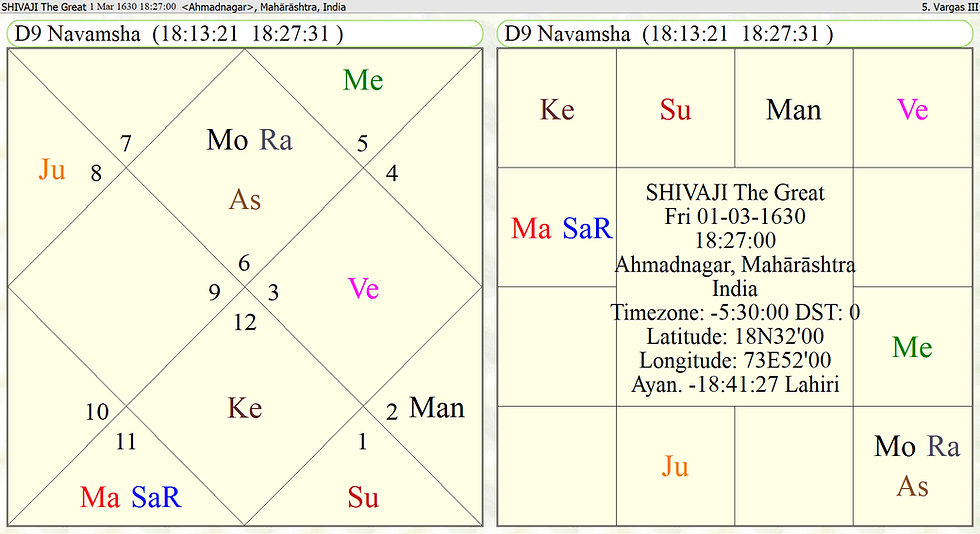Legendary Encounter: The Battle of Afzal Khan vs. Chhatrapati Shivaji (November 20, 1659)
- Sunil Dutt

- Sep 19, 2024
- 5 min read
Updated: Apr 17, 2025
The Astrologer’s Prophecy
In 1659, a local astrologer in Bijapur foretold that Afzal Khan would not survive his battle against Shivaji. This prediction, documented in The Old Capitals of Adil Shahi Kings by Henry Cousens, highlights the powerful role of astrology in shaping historical events. Such prophecies often captivate our imagination, adding depth and mystery to the narrative of this legendary encounter.
Keywords: Afzal Khan, Chhatrapati Shivaji, Battle of Pratapgad, Vedic astrology, astrological prediction, The Old Capitals of Adil Shahi Kings, Henry Cousens, Bijapur, 1659, Maratha history.

The Astrologer’s Prophecy and Its Impact
In 1659, a local astrologer in Bijapur predicted that Afzal Khan would not survive his battle against Chhatrapati Shivaji. This prophecy, recorded in The Old Capitals of Adil Shahi Kings by Henry Cousens, came true when Shivaji defeated Khan on November 20, 1659. Remarkably, Khan, a firm believer in astrology, was so convinced by the prediction that he prepared his grave and noted the year before heading to battle. This shows the deep influence of astrological beliefs on actions and decisions during that era. Such predictions add mystery and depth to historical narratives, making them fascinating to explore.
Historical Context and Astrological Beliefs
Sultan Ali Adil Shah II sent Afzal Khan, a commander of the Adil Shahi dynasty, to confront Shivaji. According to Henry Cousens, a former superintendent of the Archaeological Survey of India (1891–1910), Khan relied heavily on astrology, consulting astrologers before any major decision. This faith in predictions shaped his approach to the battle, highlighting the power of belief in historical events.
Shivaji’s Birth Chart Research
To understand this event, researchers sought the birth charts of Afzal Khan and Chhatrapati Shivaji. Only Shivaji’s chart, rated B on Astro-Databank, was found, thanks to the efforts of D.V. Apte and M.R. Paranjpe, who determined his accurate birth date and time. This chart offers insights into Shivaji’s destiny, aligning with his victory in this legendary battle.



Verifying Shivaji’s Birth Chart
Shivaji’s birth chart reveals connections to significant life events:
Marriage to Rani Sai Bhonsale (May 16, 1640): During the Rahu-Saturn-Saturn Vimshottari Dasha, Saturn (7th Lord), exalted in the 3rd house and aspected by Venus (3rd and 10th Lord) and Jupiter (5th and 8th Lord), indicated a wise and beautiful spouse.
Rani Sai’s Death (September 5, 1659): During Jupiter-Mercury-Saturn Dasha, Jupiter (8th Lord) in the 7th house and Mercury in the 8th house, linked to chronic illness and loss, with Mercury in the 12th house of Navamsa under Saturn’s (6th Lord) aspect, confirmed her passing.
Rajyoga and Dhan Yoga: Keys to Success
Shivaji’s chart is rich with Rajyogas and Dhan Yogas, signaling wealth, power, and success:
Sun and Jupiter in 7th House: Non-combust Jupiter (5th Lord) supported growth in education, creativity, and speculative gains.
Exalted Saturn in 3rd House: Aspected by Jupiter, it indicated success through courage, discipline, and partnerships, boosting authority and recognition.
Chandra Adhi Yoga: Jupiter, Venus, and Mercury in the 6th, 7th, and 8th houses from the Moon created prosperity and leadership. Jupiter in the 6th house helped overcome enemies, Mercury in the 7th enhanced communication and partnerships, and Venus in the 8th brought wealth and transformation. This combination marked Shivaji as a natural leader, fit for royalty.
Rahu in 10th House and Nakshatra Exchange
Rahu in the 10th house fueled Shivaji’s ambition and unconventional leadership, driving success in career and public recognition. As praised in Bhavartha Ratnakar, this placement forms a Rajyoga, granting royal status, authority, and fame. However, Rahu’s intense effects depend on its interactions with other planets.
The Nakshatra exchange between Rahu (exalted in the 10th house) and Mars (ruling a trine house, the 9th House) created a potent Rajyog. This combination amplified Shivaji’s courage, strategic thinking, and determination, enabling him to achieve goals and overcome obstacles with assertive leadership.
The Battle of Pratapgad: A Historic Clash
On November 20, 1659, Shivaji faced Afzal Khan, an experienced Adil Shahi commander, near Pratapgad Fort, Maharashtra. The battle stemmed from tensions between Shivaji’s growing Maratha influence and the Adil Shahi Sultanate’s efforts to suppress it. Known for his guerrilla tactics, Shivaji outmaneuvered Khan, securing a legendary victory that solidified his reputation as a formidable warrior king.
Shivaji’s Victory at Pratapgad: Tactics and Astrology (November 20, 1659)
Discover how Chhatrapati Shivaji outsmarted Afzal Khan in the Battle of Pratapgad on November 20, 1659. This article explores Shivaji’s clever tactics, the astrological influence of his Jupiter-Mercury-Saturn Dasha, and insights from his Navamsa chart, revealing how strategy and destiny led to his historic triumph.
Shivaji’s Smart Plan for the Meeting
Shivaji agreed to meet Afzal Khan for talks at the foothills of Pratapgad Fort, despite warnings of Khan’s betrayal. To stay safe, Shivaji wore armor under his clothes. During the meeting, Khan tried to kill Shivaji with a hidden dagger while hugging him. Shivaji, quick and prepared, struck back with wagh nakh (tiger claws), fatally wounding Khan. In the chaos, Shivaji’s Maratha forces, hidden nearby, ambushed Khan’s army, winning the battle.
Why the Battle Mattered
The Battle of Pratapgad was a major victory for Shivaji and the Marathas. It showed they could stand up to the powerful Adil Shahi Sultanate and boosted Shivaji’s fame as a brave and skilled leader in Indian history.
Astrology Behind the Victory: Jupiter-Mercury-Saturn Dasha
On November 20, 1659, Shivaji was under the Jupiter-Mercury-Saturn planetary period (Vimshottari Dasha), which shaped his success:
Jupiter’s Influence: As the main planetary lord, Jupiter’s effect on the 3rd house brought wisdom and growth, helping Shivaji plan wisely.
Saturn in 3rd House: Strong and exalted as the 6th Lord (enemies) in the 3rd house (courage and effort), Saturn gave Shivaji strength and discipline. Supported by Venus (3rd and 10th Lord) and Jupiter (5th Lord), it formed a Rajyoga, leading to recognition and success through hard work.
Mercury in 8th House: Though weaker, Mercury, as the 11th Lord (gains) in the 8th house (hidden plans), was powerful Rajyogakarka, indicating favorable results despite its debilitation, as per Brihat Parashara Hora Shastra (Chapter 40, Shloka 30). It pointed to a clever ambush, showing Shivaji’s sharp thinking.
This planetary combination supported growth, smart planning, and victory through careful efforts, perfectly matching Shivaji’s tactics at Pratapgad.
Navamsa Chart: Shivaji’s Warrior Destiny
The Navamsa chart, a key part of Vedic astrology, gives deeper insights into Shivaji’s life and destiny:
Jupiter in 3rd House: Jupiter in the 3rd house of effort brought wisdom and communication skills, helping Shivaji take bold steps to achieve his goals.
Saturn and Mars in 6th House: Saturn, the 6th Lord, and Mars, the 3rd Lord, in the 6th house created a Kshatriya (warrior) personality. This placement showed Shivaji’s strength in facing enemies, health issues, and challenges with courage and competitiveness.
Mercury in 12th House: As the 10th Lord (career), Mercury in the 12th house of sacrifice and hidden work suggested Shivaji’s leadership involved behind-the-scenes efforts. Its influence on Saturn and Mars highlighted his smart communication and planning to overcome obstacles.
These placements reveal a challenging life with battles and hurdles, but Shivaji’s wisdom, discipline, and strategic thinking helped him succeed as a great leader.
Conclusion
The Battle of Pratapgad highlights Shivaji’s brilliance as a warrior and the role of astrology in his victory. His Jupiter-Mercury-Saturn Dasha and Navamsa chart show how courage, smart planning, and destiny came together to defeat Afzal Khan. This historic event remains a fascinating story of strategy and strength in Indian history.
Published in Express Star Teller September 2024 issue
Written and Researched by Sunil Dutt








Comments